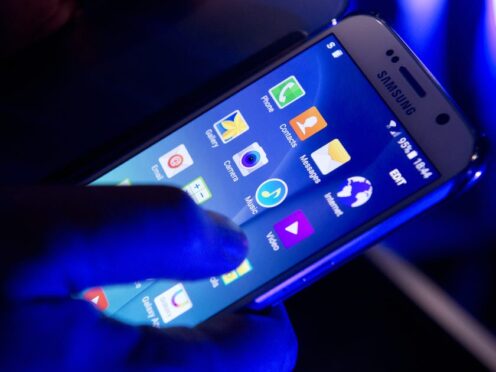
Most parents believe the Government should ban smartphones for under-16s, a poll has suggested.
More than four in five (83%) parents said they felt smartphones were “harmful” to children and young people, according to a survey.
Charity Parentkind is calling on all political parties to put a ban on smartphones for children in their manifestos ahead of the general election.
It comes as Esther Ghey, the mother of murdered teenager Brianna Ghey, is campaigning for an age limit for smartphone usage and stricter controls on access to social media apps.
A poll commissioned by Parentkind, of 2,496 parents of school-aged children in England, suggests that 58% of parents believe the Government should introduce a ban on smartphones for under-16s.
The figure is even higher among parents of primary school children, where more than three in four (77%) would back a smartphone ban for under-16s.
The online survey, conducted by WeThink between February 19 and March 4, found only 16% of parents of secondary school children support a smartphone ban for under-16s.
Nearly nine in 10 (89%) parents said they were concerned their children could face online bullying and abuse through using a smartphone, while 87% were worried they might access harmful content online.
Last week, schools minister Damian Hinds told MPs on the education select committee that getting a mobile phone between primary and secondary school had become a “rite of passage” for nearly all children.
More than half (53%) of parents surveyed said they have felt pressure to give their child a smartphone at a younger age than they would prefer.
More than two in three (69%) parents believe that limiting children’s access to smartphones would make life easier for them as a parent, the poll found.
Jason Elsom, chief executive of Parentkind, said: “Society has sleepwalked into a position where children are addicted to harmful ‘electronic drugs’ and have no escape from their digital dealers.
“We are starting to understand the harms of social media and the unrestricted gateway smartphones provide to vile online content but it seems parents already get it.
“Most parents want the Government to help them overcome the peer pressure that leads to their children needing mobile phones by banning these devices and a huge majority of parents of primary school children back a ban because they are terrified of their children becoming ensnared by a smartphone as they get older.”
He added: “The pressure is starting to mount on the Government to act and political parties to come together on this issue to protect children. This should be as uncontroversial as banning vaping for children.
“Every party should put a ban on smartphones in their manifesto, something we will be calling for along with parent groups across the country.”

Esther Ghey said: “It is amazing to see the wave of support for the campaigns we are promoting around mindfulness in schools and mobile phone safety.
“The message has obviously resonated with parents who, through the poll, are saying that they share my concerns about safety for our young people when it comes to mobile phone use.”
She added: “Although we are not working with Parentkind, we fully support any charities and campaigns that share our concerns and also want to help create a safer more empathetic and resilient world for our young people.”
In February, schools in England were given non-statutory Government guidance intended to stop the use of mobile phones during school hours.
A Government spokesperson said: “The educational and social benefits of technology are immense, but this should not come at the expense of children’s safety. That is why we issued guidance on banning smartphones in schools last month to support teachers and keep schools as a place of learning.
“The majority of social media sites say they do not allow under-13s. Once implemented the Online Safety Act will require platforms to enforce their age limits and protect children from accessing harmful and age-inappropriate content.”

Enjoy the convenience of having The Sunday Post delivered as a digital ePaper straight to your smartphone, tablet or computer.
Subscribe for only £5.49 a month and enjoy all the benefits of the printed paper as a digital replica.
Subscribe